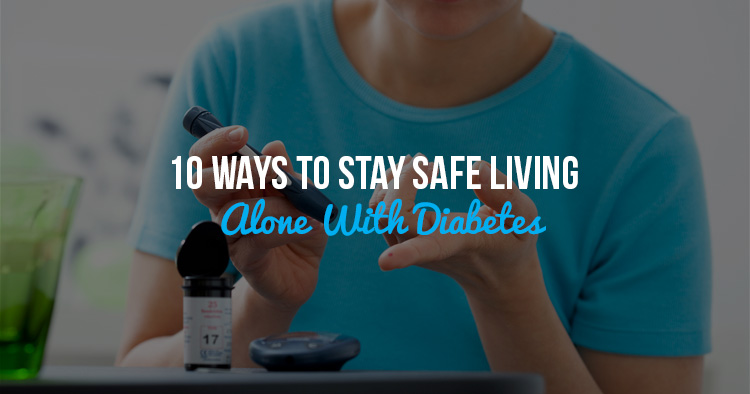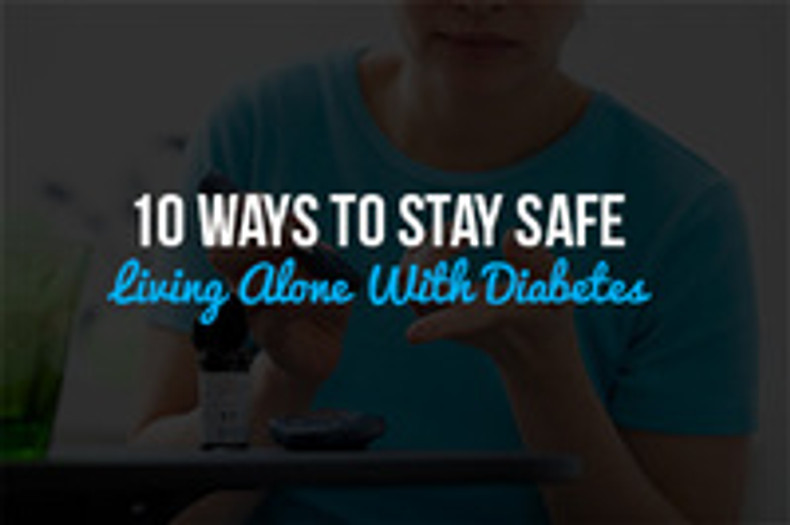
10 Essential Tips for Safe Solo Living with Diabetes
Diabetes can be a very serious health condition to live with as low blood glucose symptoms can come on fast, sometimes even when you are sleeping. You probably already know your systems of having low blood sugar, the hunger, sweating, shaking, dizziness and even confusion. When these hit, you probably have some juice or glucose tablets close at hand to bring up your blood sugar level. Some people may not even experience these systems to let them know that something is wrong. This can be pretty frightening when you live alone, but taking steps to stay safe while living alone with diabetes will help to protect you. Hypoglycemia is a very real risk, and you should be working to prevent and prepare yourself for this possibility to live an independent lifestyle when you have diabetes.
Follow the Rules
Yes, if you live alone with diabetes you need to follow the rules. You need to check your blood sugar regularly, keep up with your doctor appointments, take your medications as prescribed, and eat the proper diet. Taking control of your diabetes is the first way that you will be able to stay safe. Remember that stress, other medications, weight changes, and other factors in your life may have an impact on your glucose levels. You will also want to keep track of your glucose readings to share with your doctors so that you are able to keep them informed. This information may show that you need different medications or doses. You may even want to look into having a continuous blood glucose monitoring system if you live alone as it will help you keep a closer eye on your glucose levels. This may not be covered by your insurance, but can provide a safety net when you live alone if you are worried about your glucose levels.
Set Goals
You and your doctor should talk about what your goal range should be with your blood glucose. This is the magic number of where your level should be at when you check your glucose that means it is not too high or too low. If you find that you are having frequent readings that are outside of this range, it may mean that your medications need adjusting. This is important to talk with your doctor about to get the best treatment possible. You may just need to start having a bedtime snack, like Glucerna, to help with overnight lows you may be experiencing, but speaking with your doctor will help come to the best determination.
Prepare For Hypoglycemia
Medications like insulin or sulfonylureas play a role in lowering blood sugar, and can play a role in a diabetic experiencing hypoglycemia. This can be especially true at night when you are sleeping as you would not notice the immediate symptoms of your low blood sugar when they first start occurring. You need to start recognizing your own symptoms of hypoglycemia to understand when you will need to treat yourself for this condition. Some people are hypoglycemia unaware meaning that they do not have the typical symptoms of hypoglycemia to let them know when they are experiencing this condition. Some medications may even dull or mask your hypoglycemia symptoms, so that makes understanding how it impacts your system very important.
After you know your signs and symptoms, prepare for how you are going to combat it. This can be accomplished by keeping glucose tablets, glucose gels, or juice boxes nearby. Living alone means that if your only source of rapidly absorbed glucose is in the kitchen, you won’t be able to ask someone else to get it for you. You should place these items in your bedstand, in your living room, in your car, and even carry them in a bag or a purse. Having these close at hand can help you to treat your symptoms without adding the potential for falling. You can often be quite disoriented, confused, and dizzy when this strikes, so it just makes better sense to be prepared by having these items close.
Information to Have on Hand
 ou’ve probably seen or even have one of those medical alert bracelets that inform others that you have diabetes. This is great information to have with you at home or on the go in case of an emergency. You should also keep some other additional information to get you the best care from first responders. You may want to keep a list of your emergency contacts in your wallet. This should be your family, friends, your doctors, and even your pharmacy. Some phones allow you to program in emergency contact information that can be accessed without unlocking your phone.
ou’ve probably seen or even have one of those medical alert bracelets that inform others that you have diabetes. This is great information to have with you at home or on the go in case of an emergency. You should also keep some other additional information to get you the best care from first responders. You may want to keep a list of your emergency contacts in your wallet. This should be your family, friends, your doctors, and even your pharmacy. Some phones allow you to program in emergency contact information that can be accessed without unlocking your phone.
You should also keep your health records together where they can be easily accessed in the case of an emergency. This information can be vital if you are in a crisis and cannot respond to health care workers. You can keep some basic information on a card in your wallet or carry a USB device that is a bracelet or necklace that has your medical information stored on it. There are even apps that can be put on your phone that will contain your health records. If you have paper files, you can leave a note for friends and family for where you keep the records or let them know beforehand just in case.
Be Smart About Exercising
Exercise is important for everyone, and people with diabetes should get the proper amount of exercising in after speaking with their doctor about the right amount of exercise for them. A worry that can come up with physical activity is that it can lower blood glucose levels, so you need to be smart about exercising. You should be prepared to check your blood glucose levels before and after your exercise routine. If you are engaging in a long period of exercise, you may even want to check it sometime during that period of time. Keep a snack with carbohydrates close by in case your glucose drops.
You may not even consider the activity that you are doing as exercise, but long shopping excursions, gardening, walking during your vacation or moving out and more, can all cause your blood sugar level to drop. This may cause hypoglycemia as you may not even be aware that this activity is acting in the same manner as exercise would. You may want to cut back on your diabetic medications before engaging in these activities, keep your glucose meter close, and eat carbs to help prevent this from occurring.
In some people, physical activity may not immediately lower their blood sugar, but they may have a delayed reaction where their blood glucose level doesn’t drop for hours after. Keeping track of your activity, glucose readings, and mealtimes may help to identify what caused the drop and help to prevent it in the future.
Create a Network
Living alone and being independent doesn’t mean that you are in this alone. You should create a network of friends and family that you can depend on to help check on you. Text messages, phone calls, visits are all good ways to keep an open line of communication. This is your support system should anything go wrong. Have a glucagon kit handy in case you are unable to treat yourself for hypoglycemia, and teach your neighbors, friends, and family on how to use it.
Get a Dog
Sure, you can get a dog to help you monitor your glucose. Seriously, there are service dogs that actively monitor their human’s blood sugar and are able to alert you to when you are too low. This does not mean that you will have to stop pricking your finger, but can be a great tool in your living alone arsenal. The cost of a service dog can be pretty steep, but there are some programs available to help if this sounds like something you’d enjoy in your life.
Ask for Help
Just because you can get along with living alone, doesn’t mean that you have to do everything on your own. You may be able to get some assistance that can help to improve the quality of your life. There are senior centers that you can visit during the day if you would rather be with other people or have a home aid check on you. Talk with your insurance company and local organizations about what services you may be eligible for if cost is an issue.
Monitoring Tools
Sometimes being independent with a condition like diabetes means that you have to make some adjustments to how you live your life. You may want to look into those alarm system companies that offer health monitoring services, such as Life Alert. With this, you still get your individual lifestyle without worrying that no one will help you when you need it most.
Live
The final way to stay safe living alone with diabetes is to live. You should not be in constant fear when living alone with diabetes. Find the resources that you need to make it possible to live your life feeling comfortable. If living alone is not working for you, do not feel that you have to live this way. Talk with your family and friends to find the best solution for you. Contact local organizations and other resources to find a better solution to improving your quality of life.

